INDIAN ARMED FORCES CHIEFS ON OUR RELENTLESS AND FOCUSED PUBLISHING EFFORTS

The insightful articles, inspiring narrations and analytical perspectives presented by the Editorial Team, establish an alluring connect with the reader. My compliments and best wishes to SP Guide Publications.

"Over the past 60 years, the growth of SP Guide Publications has mirrored the rising stature of Indian Navy. Its well-researched and informative magazines on Defence and Aerospace sector have served to shape an educated opinion of our military personnel, policy makers and the public alike. I wish SP's Publication team continued success, fair winds and following seas in all future endeavour!"

Since, its inception in 1964, SP Guide Publications has consistently demonstrated commitment to high-quality journalism in the aerospace and defence sectors, earning a well-deserved reputation as Asia's largest media house in this domain. I wish SP Guide Publications continued success in its pursuit of excellence.
- The layered Air Defence systems that worked superbly, the key element of Operation Sindoor
- Operation Sindoor | Day 2 DGMOs Briefing
- Operation Sindoor: Resolute yet Restrained
- India's Operation Sindoor Sends a Clear Message to Terror and the World – ‘ZERO TOLERANCE’
- Japan and India set forth a defence cooperation consultancy framework, talks on tank and jet engines
“Our focus and priority are to nurture the friendship with India when it comes to international relations”
—Tshering Tobgay, Prime Minister of Bhutan
In a very exclusive interaction, Manish Kumar Jha speaks with Prime Minister Tshering Tobgay in Thimphu, Bhutan over the range of issues which will further reaffirm the historic bilateral relations with India. In a first, the Prime Minister also talks about the roadmap for technological advancement, especially in space tech, digital public infrastructure, Artificial Intelligence, and the new and emerging technologies for the bright and young citizen of Bhutan.
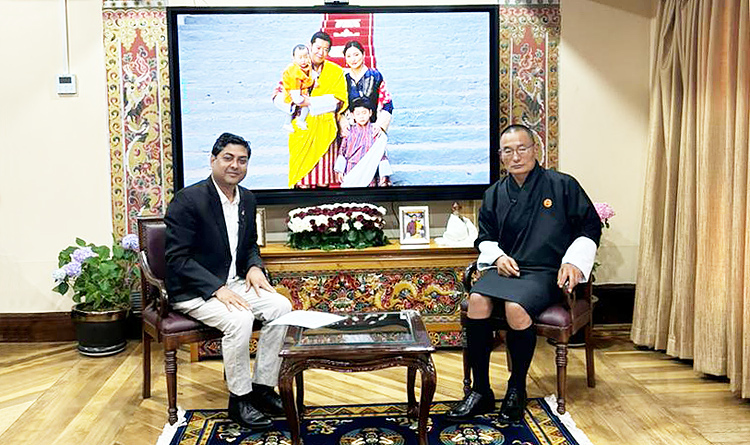
India and Bhutan are the closest of partners. In fact, India, and Bhutan's partnership span across economic, security as well as cultural ties. The historic partnership is unfolding in a new era in different dimensions. And, in a continuity, it is going stronger. Despite its small size, Bhutan holds a unique position providing an alternative model of development. Despite the economic pressure and dimensions within, Bhutan is sticking towards its sustainability programme. A focus on green energy and charting its course.
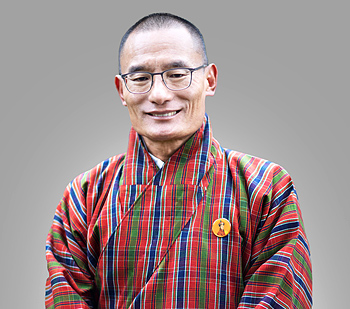
Manish Jha (Jha): India-Bhutan relations are the closest between the two neighbours despite deferring in size vastly. What is behind such relations?
Prime Minister Tshering Tobgay (PM Tobgay): Yes, we are a close neighbour and family but our friendship is special. Because not just to the test of time but over the decades it has been going from strength to strength. What drives our friendship is our leadership. In this case, it is our successive enlightened monarchs who have nurtured our friendship with India and ensured that our friendship grows from strength to strength.
In India, it is your successive Presidents and Prime Ministers and most recently, Prime Minister Narendra Modi. Under his tenure, the friendship between our two countries has grown to unprecedented levels. And this is why I say our friendship is special. It is unique. It is an example of good neighbourliness and good friendship for the rest of the world and that friendship is developed, nurtured, and maintained.
"India and Bhutan are close neighbour and family but our friendship is special. Because not just to the test of time but over the decades it has been going from strength to strength. What drives our friendship is our leadership."
Jha: Prime Minister, the leadership in Bhutan in the democratic setup charted its economic development path. It is based on the alternative model of the Gross Happiness Index which is the measurement of Bhutan's economic development. While accepted, it is also debated. Could you talk about the economic progress? How is it unfolding?
PM Tobgay: Gross national happiness puts the happiness and well-being of our people at the centre of the development agenda. Gross national happiness attempts to balance economic growth. Economic growth is important, that's undeniable. But economic growth must be balanced with social progress equity, environmental preservation, culture and good governance. This holistic form of development is the so-called gross national happiness, and we attempt to be true to the ideals and principles of gross national happiness in developing our economy.
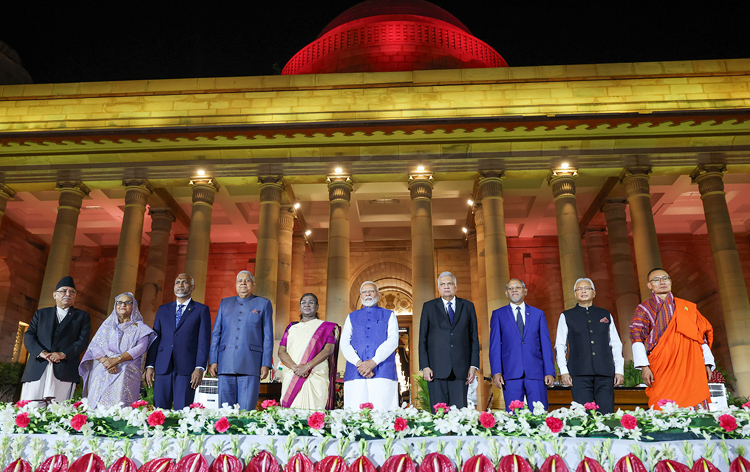
Are we there yet? Not by a long shot! We have a lot to do in strengthening our economy and growing our economy and in doing so we aspire to continue to be faithful to the principles and ideals across National happiness that has gotten us this far.
Jha: Bhutan's concerns for the environment are globally recognised as the only carbon-negative country. It is also a difficult debate against the demand for urban modernisation and Industrial expansion. There's always a conflict in this case. What is your model for future sustainability in that case?
PM Tobgay: Well, we are fortunate. And we are proud that we are. About the negative carbon country, as you pointed out, we are just 1 of 3 countries worldwide the other two being Panama and Suriname. Then being a carbon negative, we were the first to be recognized as such. We are a carbon-negative [Country] because of the enlightened leadership and enlightened policies of our kings. We are carbon-negative because of the ideals of gross national happiness. We aspire to continue to be carbon-negative as we continue to grow in our development Journey.
Is there a trade-off? Yes. We cannot have unbridled economic growth. If you want to become a negative if you want to be environmentally sustainable. Is it one or the other not necessarily so? We can balance. Yes. Urban living does not necessarily have to be environmentally destructive. We can have a middle path where people can live in an environment space which is respectful of one another and is respectful.
"Under Prime Minister Narendra Modi, the friendship between our two countries has grown to unprecedented levels."
His Majesty, the King's Royal vision of the mindfulness city is all about a city that will be spread across more than 2,000 square kilometres, which will encompass at least two of our ancient protected areas. That's going to be that is carbon negative and that is going to be one of the most sustainable cities in the world. So, is it possible? Yes. I know in most other countries; it will be a big challenge. To assume the middle path between urban growth, urban living and natural sustainability. In Bhutan, we have the upper hand because it is basically, an extension of gross national happiness.
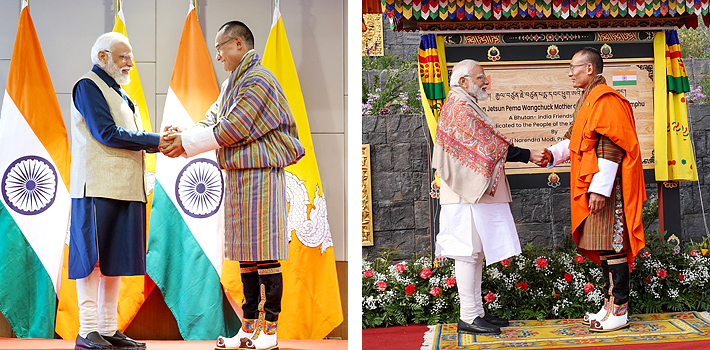
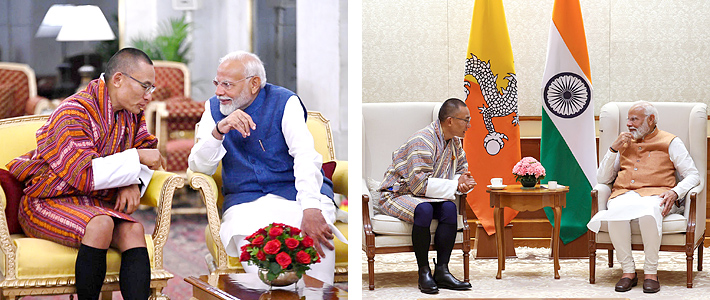
Jha: One of the fundamentals of achieving this is of course through green and clean energy. Bhutan's thrust on clean energy especially in the sectors of hydropower, solar and green hydrogen is a priority. Could you talk about the road map for further growth based on clean and green energy?
PM Tobgay: Well except for a few outliers, in the world, almost everybody has accepted, that green energy is important, that we cannot continue to depend on fossil fuels that this is bad for our planet--bad not just for the future but for ourselves closer to our home. And so, a similar intensity in focusing on green energy in Bhutan. We are blessed because in the Himalayas we have a lot of fast-flowing rivers which can generate more than 30 gigawatts of clean energy. We have generated 30,000 megawatts of clean energy and so far.
While we are already exporting electricity to India. We have tapped only 7.5% of our potential. You asked me about what is the plan going forward. We are going to accelerate the development of hydropower production in the country. Plus, we are accelerating the development of solar. Farms in the country to tap into solar energy.
To produce clean fuel Hydrogen, green ammonia and the like, which we will consume ourselves and sell to our neighbours will create a major contributor to our economic growth. With the slow calculated development of Hydropower, our economy will experience a boost. And that boost is going to environmentally sustainable, so that we can enjoy the best of both worlds.
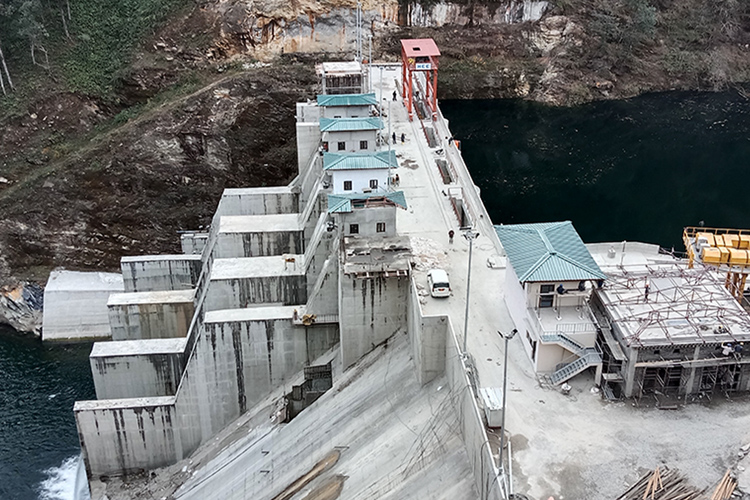
Jha: Beyond Energy, Bhutan is also embarking on an ambitious plan towards rapid socio-economic progress and technological advancement especially in space technologies, digital public infrastructure, Artificial Intelligence, and such new and emerging technologies. What are the challenges in terms of funding and skill development? And how are you progressing? What's your vision?
PM Tobgay: Well, we don't have a choice. We have to adapt. Digital economy does not just adopt digital technology but uses it in a relevant way. But remember, technology is not the goal.
The idea is to leverage technology and use technology to grow mindfully and to enhance the happiness and well-being of our people. Now in doing so technology is also expensive. And our economy is small in using such technologies like computing power, digital infrastructure, artificial intelligence, blockchain, web 3.0 or any form of technology for us, because we have a small economy and a small population of just 7 lakh people.
So, the per capita cost becomes prohibitive and this is very expensive for us. But, that said, we don't have a choice. We must adopt and yes -- relevant technologies. And for this, we must prioritise our investments and one of the priorities is digital technology.
Jha: And then how about skilling the youth of this country, preparing for such emerging and modern technologies? How are you planning to skill your citizens, the young, bright students, and the people of Bhutan?
PM Tobgay: Start From pre-primary school. You'll have to start from there and go to Primary School. Our children will need to be exposed to the world of technology now. We don't have a choice. Technology-- digital technology--is ubiquitous. And so, we must expose all our children to technology. In the schools, we must provide them the opportunity to enhance their knowledge and skills in the area of technology as they finish school.
We must provide them technical-level courses, diploma-level courses, and college-level courses that will allow them to specialize in technology. We've got to be able to provide a landscape, an investment environment that's friendly to develop technology-related business. And finally, they will be training and retraining the adult population. All this is unavoidable, but it requires investment.
Jha: Do you think these inputs and elements of technologies will help you diversify the economy, apart from tourism in a sustainable way? Do you think these are the methods to achieve and catalyse the economic growth of Bhutan?
PM Tobgay: Yes, we've got to diversify the economy from hydropower and agriculture. At the moment, we've got to diversify the tourism sector itself while continuing to be faithful to a policy of high-value and low volume tourism. Diversify because not just it brings in revenue, but that revenue is spread throughout a cross-section of society and in all this as we diversify our economy, as we continue to grow socially and the growth is largely inclusive. The role of Technology will be better managed.
"We are a carbon-negative country because of the enlightened leadership and enlightened policies of our kings. We are carbon-negative because of the ideals of gross national happiness."
Jha: Despite some excellent initiatives in various sectors of the economy, there are reports of a large-scale migration of youth from Bhutan. Is it a worrisome trend or a quest for international outreach for skills and jobs? How is the government addressing this?
PM Tobgay: It's good on the one hand if you are looking for better opportunities to learn, to study, to work and to earn. And for that, the whole world is available for them because they are relatively well educated, can speak English fairly fluently are very hardworking and are trustworthy. So regardless, they could go anywhere in the world. They are in high demand. While working abroad they not just learn but acquire experience, they acquire new skills and they are able to actually save money. So, all this is important. But the other aspect of migration for Bhutan is that it is a big concern and we want our youth to not go out. Acquiring knowledge, skills, earning and hopefully return as soon as possible. Our population is still very small and we've invested a great deal of resources. And when we had large numbers of youth going out, those numbers mean we have fewer professionals here and less youth here and as such it could constrain our economy. So, we're looking at it from both sides. And again, the answer the solution will lie somewhere in between in finding the right balance.
Jha: Is it a matter of concern, Prime Minister?
PM Tobgay: Yes. We see the opportunity also and so we've got to address a balance it.
Jha: How does Bhutan manage its diplomatic role amid such volatile situations worldwide? It's often seen as a role model in terms of managing and navigating the clumsy geopolitics today. What is behind that secret?
PM Tobgay: Our main friend, a principal ally Is India. To a large degree, our focus and our priority are to nurture the friendship with India when it comes to international relations. Besides India, we have diplomatic relations with only a select number of countries. And with them, we maintain good relations. In fact, we have very few diplomatic missions. It is only a handful of places in the world. And each of those missions look after multiple countries. And they are overstretched. But this is after all a small country, can we engage meaningfully? We sincerely deal with as many countries as possible and we use the multilateral organisations, the UN for example, to engage at a multilateral level to the extent possible.
Jha: I again bring back the concern for the environment and here in Bhutan, that is the way of life. Do you want to take this issue at the global level as a champion of such a cause?
PM Tobgay: It's not necessary for Bhutan to champion it. The world over, people are already concerned, the youth are very anxious and Bhutan does not need to take leadership in this case. In the world, the youth are taking the leadership.
Jha: Bhutan has successfully shown a workable model which is sustaining and thriving amidst the widespread ongoing conflicts in the geopolitics. Lastly, what is that the world can learn from Bhutan in terms of climate issues, global conflict, and economic uncertainties?
PM Tobgay: We learn from everybody. Every country can learn from the other; can learn from a neighbour who can learn from our country that is very far also. Now, with the digital technology, everything is in the palm of your hands. The world is in the palm of your hands through technology. You can learn from one another and you can share with one another as far as relations are concerned. There's no message as such.
We live our lives according to our values and according to our priorities. We are fortunate that the world respects us for it and that we can be an inspiration. If our story can inspire even one person, we are blessed.
Thank you, Prime Minister for your time here in Thimphu!





